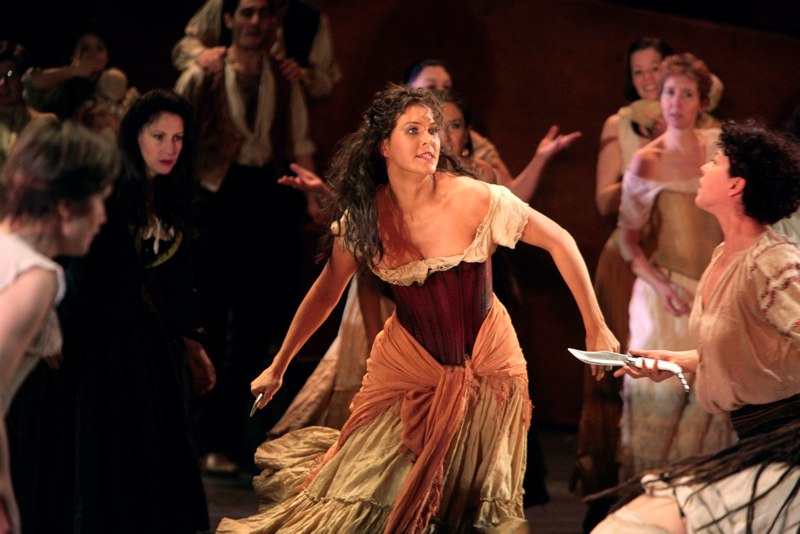Even with its sultry Carmen, Palm Beach Opera’s Bizet fizzles rather than sizzles

Viktoria Vizin as Carmen provided the highlights in Palm Beach Opera's Bizet production Friday night at the Kravis Center.
The entrance of the toreador Escamillo was brilliant, a fiery set piece as the swaggering hero took the stage. And, as Carmen, the young Hungarian mezzo Viktoria Vizin brought a sultry but subtle style and a voice that was particularly strong and dark in the lower register, where the Gypsy seductress expresses her deepest emotions.
Yet Palm Beach Opera’s production of Carmen, which ends the company’s season this weekend, lacks the sizzle and dramatic punch needed for a successful performance of Bizet’s masterpiece. The orchestra displayed its usual technical competence but played without much fire or intensity, allowing Bizet’s sensuous melodies to come off as too square. And there wasn’t much chemistry between the singers in the two leading roles, draining further energy from the performance.
The company’s previous production was a strikingly original, almost abstract staging of Don Giovanni. This one was traditional, with arches of dark brick, torches, and Spanish ladies in black with fans and parasols. The arches were called on to do quadruple duty in these economically challenging times, providing the setting of the square in Seville, tavern, mountain pass and bull ring. Stage direction was vigorous, with scenes of well-choreographed violence as the cigarette girls fought outside the factory or an officer punched Don José in the stomach and ripped off his stripes for allowing Carmen to escape.
The company’s artistic director, Bruno Aprea, turned over the baton for this production to the young French conductor Jean-Luc Tingaud, founder of the Paris chamber orchestra OstinatO and associate conductor of the Opéra-Comique, the company that premiered Carmen in 1875. Under his direction, the orchestra performed with great precision, with particularly strong work in the winds and horns in long exposed passages. But the orchestra lacked the intensity and expressive phrasing that seems to come naturally under Aprea. And passages such as the fate motif or the tutti after Carmen drops a flower in front of Don Jose, came off without any bite or power.
Viktoria Vizin has made a specialty of the role of Carmen, and it’s easy to see why. She has sensuality to burn, and when she peeled an orange as she sang L’amour est un oiseau rebelle, she did so with as much passion as has probably ever been devoted to that fruit, tossing bits of peel to soldiers and squeezing the juice over her body.
Yet her Carmen was surprisingly introspective, rather than the flighty, pleasure-loving gypsy of the typical performance, and in her arias she appeared to be singing as much to herself as to others. She was at her best in the dark arias that used her smoky lower register, such as En vain pour éviter les réponses amères, when she realizes the cards foretell her death.
There were few sparks between Vizin and the Italian tenor Andrea Caré, who portrayed her lover, the soldier Don José. She did her thing, which was to appear at various points sultry, bored, indifferent and defiant, and he did his, which was to be tortured and conflicted. But his stage presence was too weak to hold up to Vizin, lacking the subtlety and insight she brought to her role. Vocally he had what it took, although his high notes seemed to require some effort, bringing desperate passion to his final aria in which he begs for Carmen’s love before stabbing her.
As Micaëla, the sweet but determined “good” girl who provides a contrast to the vamp of the title role, the American soprano Georgia Jarman brought a luminous, focused voice to what can be a difficult part. Her characterization was a bit more sensuous and sexually aggressive than is usually the case, and this had the interesting effect, in combination with the subtler characterization of Carmen, of bringing the two leading female roles closer together rather than providing the usual night-and-day contrast. Her third act aria Je dis que rien ne m’épouvante was warm and passionate, strong in the high notes and full and focused in the final soft passage.
As the toreador Escamillo, the Panamanian-American baritone Nmon Ford dominated the production vocally and physically whenever he showed up. Clad in black and gold, he made his entrance from the top of an arch, walking down the stairs with the genial confidence of a man who can dominate without having to try. Vocally his vibrato was a bit too wide, robbing his voice of focus, but he brought a primal strength to the Toreador song, growling some of the words with a brute force that made the scene the show-stopper it was intended to be.
Palm Beach Opera’s production of Carmen repeats tonight at 7:30 p.m., Sunday at 2 p.m. and Monday at 2 p.m. (different principals Saturday and Monday). Call 561-832-7596 or go to www.pbopera.org.
Posted in Performances
Leave a Comment
Sat Apr 10, 2010
at 2:12 pm
No Comments